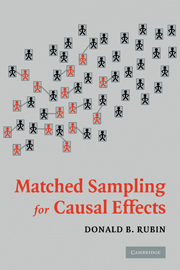Book contents
- Frontmatter
- Contents
- Contributor Acknowledgments
- Matched Sampling for Causal Effects
- My Introduction to Matched Sampling
- PART I THE EARLY YEARS AND THE INFLUENCE OF WILLIAM G. COCHRAN
- PART II UNIVARIATE MATCHING METHODS AND THE DANGERS OF REGRESSION ADJUSTMENT
- PART III BASIC THEORY OF MULTIVARIATE MATCHING
- PART IV FUNDAMENTALS OF PROPENSITY SCORE MATCHING
- PART V AFFINELY INVARIANT MATCHING METHODS WITH ELLIPSOIDALLY SYMMETRIC DISTRIBUTIONS, THEORY AND METHODOLOGY
- PART VI SOME APPLIED CONTRIBUTIONS
- PART VII SOME FOCUSED APPLICATIONS
- 23 Criminality in XYY and XXY Men
- 24 Practical Implications of Modes of Statistical Inference for Causal Effects and the Critical Role of the Assignment Mechanism
- 25 In Utero Exposure to Phenobarbital and Intelligence Deficits in Adult Men
- 26 Estimating Causal Effects from Large Data Sets Using Propensity Scores
- 27 On Estimating the Causal Effects of DNR Orders
- Conclusion: Advice to the Investigator
- References
- Author Index
- Subject Index
23 - Criminality in XYY and XXY Men
Published online by Cambridge University Press: 05 June 2012
- Frontmatter
- Contents
- Contributor Acknowledgments
- Matched Sampling for Causal Effects
- My Introduction to Matched Sampling
- PART I THE EARLY YEARS AND THE INFLUENCE OF WILLIAM G. COCHRAN
- PART II UNIVARIATE MATCHING METHODS AND THE DANGERS OF REGRESSION ADJUSTMENT
- PART III BASIC THEORY OF MULTIVARIATE MATCHING
- PART IV FUNDAMENTALS OF PROPENSITY SCORE MATCHING
- PART V AFFINELY INVARIANT MATCHING METHODS WITH ELLIPSOIDALLY SYMMETRIC DISTRIBUTIONS, THEORY AND METHODOLOGY
- PART VI SOME APPLIED CONTRIBUTIONS
- PART VII SOME FOCUSED APPLICATIONS
- 23 Criminality in XYY and XXY Men
- 24 Practical Implications of Modes of Statistical Inference for Causal Effects and the Critical Role of the Assignment Mechanism
- 25 In Utero Exposure to Phenobarbital and Intelligence Deficits in Adult Men
- 26 Estimating Causal Effects from Large Data Sets Using Propensity Scores
- 27 On Estimating the Causal Effects of DNR Orders
- Conclusion: Advice to the Investigator
- References
- Author Index
- Subject Index
Summary
Few issues in behavior genetics have received more public and scientific attention than that given to the possible role of an extra Y chromosome in human aggression. Soon after the literature began to suggest an elevated frequency of the XYY genotype among inmates of institutions for criminals and delinquents, interest in this issue had a meteoric rise; and it has been sustained ever since. This happened for several reasons. Stories about a few men who had or were presumed to have an extra Y chromosome and who had committed serious crimes were given prominent attention in the press, suggesting the intriguing idea that the single Y chromosome normally found in males contributes to “aggressive tendencies” in that sex and that an extra Y carries these tendencies beyond their usual bounds. Reports of antisocial behavior in XYY men, often based on a single case, soon began to appear in the scientific literature and were taken as evidence of an XYY-aggression linkage. The serious moral and legal implications of such a linkage attracted the interest of social scientists and legal groups to the XYY phenomenon (Shah, 1970), and students of genetics and psychology saw in it, as Lederberg (1973) has said, “one of the most tangible leads for connecting genetic constitution with behavior in man.”
A number of studies have supported the earlier finding of an elevated frequency of cases with an XYY complement among men in institutions, particularly in penal-mental institutions.
- Type
- Chapter
- Information
- Matched Sampling for Causal Effects , pp. 385 - 401Publisher: Cambridge University PressPrint publication year: 2006



